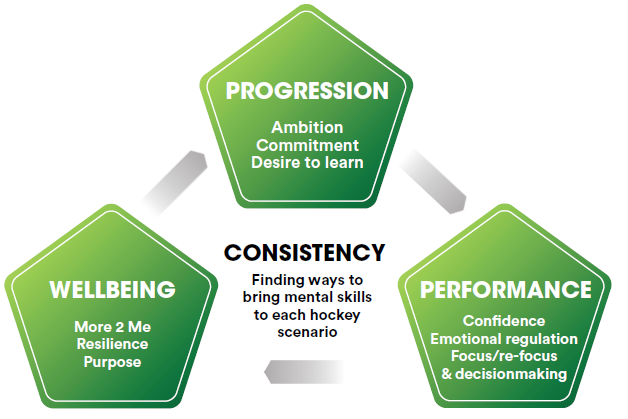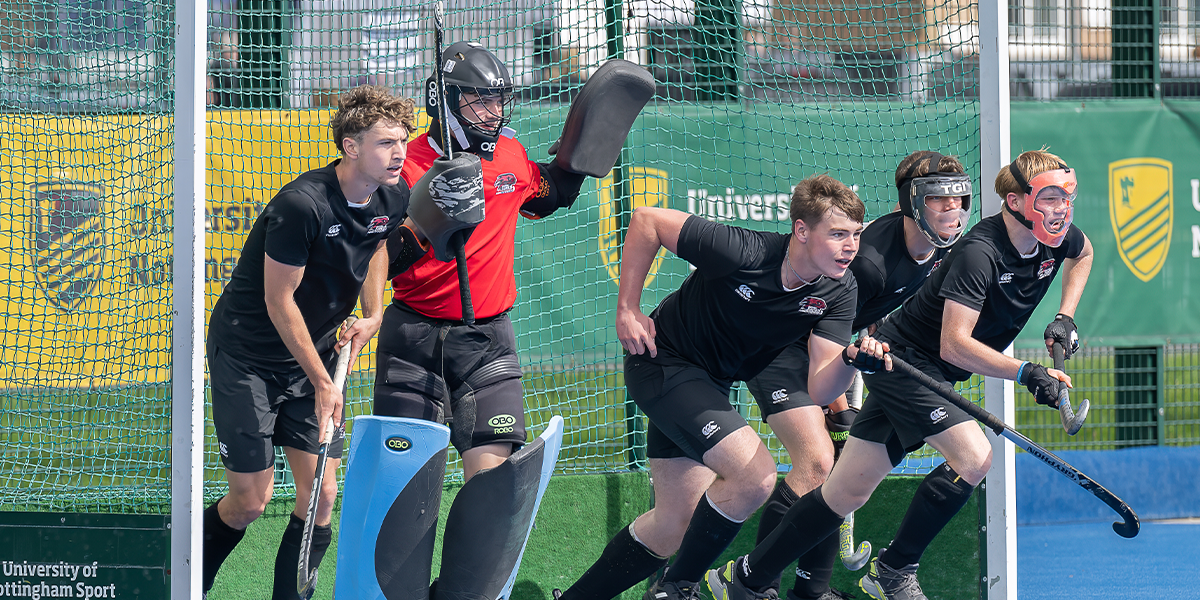Mental skills are a huge part of a high-performing players qualities. Throughout the players journey, players will have to call upon different skills at different times to ensure their talent development progresses as they would like.
The following are mental skills that a player will benefit from. It is important that these skills are developed over the course of their journey. It is important that hockey coaches recognise opportunities to develop players' mental skills. (It is equally important to recognise that the brain matures much later than our physical capabilities and therefore, we should be careful about basing signifcant non-selection decisions on ‘poor’ mental skills / adolescent behaviours).
When someone has robust mental skills, not only do they have a strong combination of the skills set out below, but they also show consistency in delivering them through training and at Elite Level through the toughest competition.

-
Psychological skills that help a player train harder and smarter than their peers over a more sustained period of time.
As a result, they have a greater chance of achieving world-class skills which underpin their confidence and ability to deliver when it counts.
MENTAL SKILL WHAT WOULD THIS LOOK LIKE? Ambition - They have a clear dream or goal and a massive inner drive to achieve it
- They are self-motivated
- They want to win but more importantly, they want to maximise their personal potential
- They have clear short, medium and long term goals
Commitment - They have a plan to maximise their chances of success. The plan includes: a realistic and objective assessment of what it will take, a breakdown of their dream goal into bitesize chunks and clear steps for how to improve, realistic time frames and strategies to avoid potential pitfalls. They believe in their plan.
- They show consistency in delivering the plan
- They can find the enjoyment or the meaning in repetitive, often gruelling training for sustained periods of time
- Their lifestyle facilitates what they want to achieve in sport
- They enjoy or find meaning in committing to daily training, regardless of outcome or what the might be missing out on. They see choices not sacrifices. And therefore are able to manage competing demands (e.g. sport, studying, social, downtime) and use their time effectively.
- They make the most of each session by being organised (i.e. on time, rested, right nutrition, equipment ready)
- They are disciplined in how they look after their body (e.g. warm up, cool down, rest, reporting niggles, rehab)
Desire to Learn - They train hard and with a clear intention to improve
- They enjoy challenging themselves and push themself out of their comfort zone to redefine what’s possible in their game
- They focus on themselves; others are a source of inspiration or information
- They are willing to make mistakes in the pursuit of progress
- They are looking to optimise every aspect of my performance and proactively work with the relevant coaches – asking questions, watching footage, learning from others
- They learn from failure by maintaining perspective and taking the right level of responsibility. They don’t blame, make excuses, respond dishonestly or unnecessarily beat myself up.
- They take the learning from feedback, even when they don’t like the message
-
Psychological skills that help a player deliver their best performance under physical and mental pressure.
MENTAL SKILL WHAT WOULD THIS LOOK LIKE? Confidence - They know what their strengths are and take confidence in them
- They take on board and benefit from positive feedback
- Confident in their skills, maybe it looks a little ruthless or like arrogance at times
- They prepare fully for tournaments, leaving no stone unturned which gives them the confidence to commit to the moment
Emotional Regulation - They have a healthy perspective that allows them to play without fear and enjoy it the stage of competitive sport (i.e. not putting undue pressure on myself)
- They see competition and pressure as an opportunity to shine, to express themselves and put out their best performance
- They reliably manage emotions to achieve optimal composure in game (e.g. if too nervous / too relaxed)
- They understand how their brain works and their mental game contributes to their and their team’s performance
- They understand how they can consistently perform at a high level and are able to focus on key aspects that allows them to bring that performance regularly in major competition.
Focus/Re-Focus - They stay in the moment
- They let go of mistakes / distractions to refocus fully
- They are able to take on information from the coach and teammates in the moment and act accordingly
- They perceive and respond to critical moments effectively, factoring in the score, what my team mates are doing, what the opposition is doing, the game plan, and the clock
- They are able to solve complex problems under fatigue and pressure.
- They think clearly and quickly under pressure, bringing the right blend of courage to adapt and discipline to commit
- They make effective decisions, executing the right action at the right time
- They know when to lead others.
- They know when to follow and can be an infectious first follower
-
Psychological skills that facilitate well-being and contribute to longevity of career.
MENTAL SKILL WHAT WOULD THIS LOOK LIKE? MORE2ME - They have interests, relationships and a sense of identity outside of sport
- They value themselves as a person and do not base that on results
- They have a strong family and friend support network who they connect with when they need to
- They are able to switch off from sport and enjoy life outside
Resilience - They persevere in the face of challenge and adversity
- They bounce back from setbacks quickly and with a smarter, stronger will to succeed
- They are always looking to find a way to win, even from the most adverse moments on the pitch and in life
- They are able to embrace and learn from difficult messages
- They can embrace hardship, physically and mentally, to better their game and grow as a person
- They open up when they need support and are willing to embrace their vulnerability to grow through challenges
Purpose - They understand their purpose to compete at Elite level is deeper than the competition.
- Their purpose is linked to their ‘why’ – what helps this person to feel fulfilled in life
- They demonstrate a desire to understand their ‘why’ and stay true to this
It is very rare, if not impossible, to find a player with all these mental skills – some skills will be more important for certain players or certain positions than others.
The environment, both at home and in sport, plays a pivotal role in how the qualities discussed are developed and expressed. Coaches and practitioners should seek to understand a player's early life experiences and family background alongside their sporting experiences.
Ask the question: What has this player experienced in life that could help us understand their behaviour?
This will help us engage most effectively. These skills are also dynamic and vary across situations, relationships, stages of psychosocial development and in the context of one’s life journey so far. Young people are not mini adults and these qualities are highly developable. Players are encouraged to focus on their strengths and effectively mitigate weaknesses – the path to perfection is never complete.




